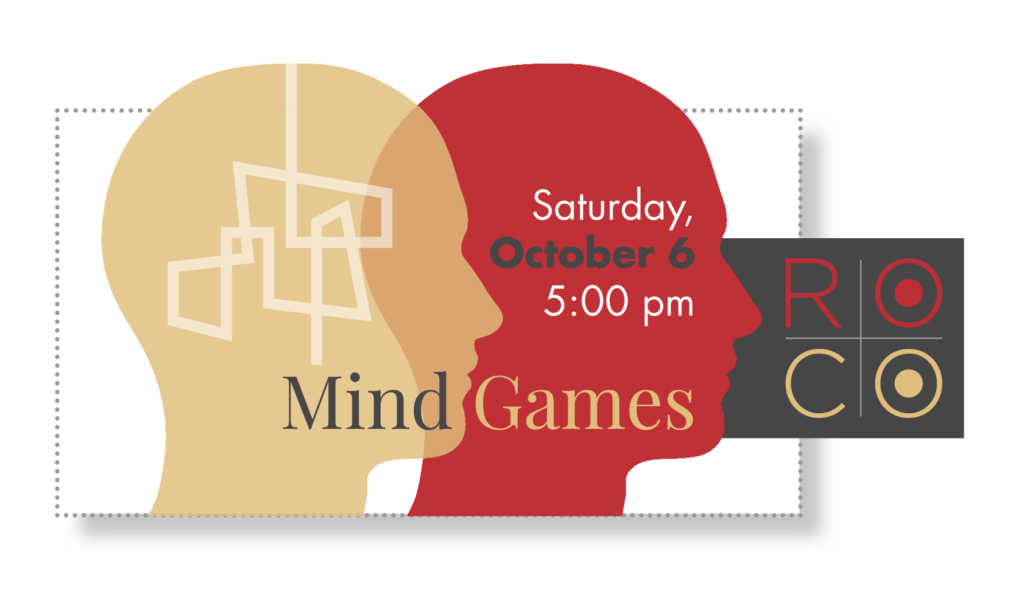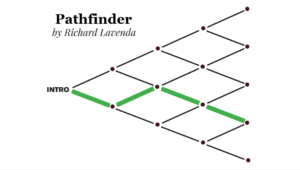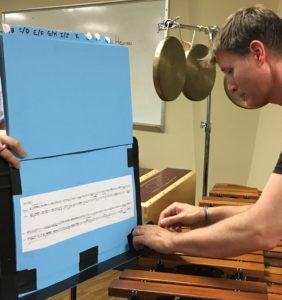
We’re back with another installment of ROCOInsider to preview this season’s first ROCO Unchambered concert, Mind Games! This week we chatted with composer Richard Lavenda, ahead of Saturday’s premiere of his most adventurous piece yet – Pathfinder, which incorporates audience input to help influence the piece’s direction in the moment.
Have you ever listened to a work and wished it ended differently? Or wondered what it might sound like if the composer had chosen a minor key instead of major, or a slow tempo rather than fast? Richard explores the unique challenges he faced in designing a piece allowing the audience to choose, and also the fun involved in offering the listener a glimpse into the decisions a composer must make when writing.
Hi Richard – so excited to experience Pathfinder this weekend! This is the first time you have worked with ROCO, right? How did this collaboration come about?
Thanks, really looking forward to it! I have known Alecia Lawyer for a long time, we had often talked about working together, and finally, the timing fell into place. Last fall, we were discussing the Season 14 theme of “Games People Play”, and I mentioned this wacky idea I had for a piece featuring multiple paths and choices, which could possibly fit well with the theme. She was up for it and thought it may work for an Unchambered concert, then trumpeter Joe Foley expressed interest in including the piece in his October program. This drove the instrumentation for trumpet, plus marimba, as percussionist Matt McClung was also available. It was a blast to work with them, they are so adventurous and open to wild ideas!
So the idea of a work with multiple choices had been around for a while – when did you first consider creating a piece in which the audience would basically determine the direction?
Well, the first genesis of the idea started with a piece I wrote for solo piano in 2007, called Consider the Alternative. This piece gave the performer a chance to make choices along the way, from multiple blocks of music and paths, to determine the final structure. In another play on this idea, I wrote a solo trombone piece in 2008, called Sometimes Words – again letting the player pick which path he would take at certain moments, based on spoken words with double meanings, which lead to sections of music illustrating the meaning the player chose. These pieces were very fun challenges for me, and equally fun for the performers, but were missing a crucial element, making them less effective – as the listener would not know what the alternative choices were or sounded like, leaving an unfortunate air of mystery.
With Pathfinder, I sought to solve this problem by inviting the audience to truly be part of the piece – in allowing them to briefly first hear a sample of each option for the moments of choice, and then to make the decision of which path to go down. Once this was determined, then it was settled to use voting by cell phone in real-time, to display the audience’s decision.
Love this! It really gives the audience investment, being in the driver’s seat to influence the shape and character of the final work in performance. But then – you must compose each possible path, and create a piece which will make sense, no matter the combination of choices they make! How did you approach this challenge?
It was a lot of work, for sure. I had to retain some control in the choices, so that the blocks could join together to create a coherent narrative and form, to create a musically satisfying piece in a full performance. I came up with a system of binary choices, each leading to further branches, in a tree-like diagram. After the first choice between Path 1 or 2, you come to the next diverging paths, and so on – always with just two options to choose from, limiting the directions you can go.

An example of one path through Pathfinder.
So in total, I’ve written 15 blocks of music, each very different in character. They range from 30 seconds to 2 minutes long, and regardless of the paths chosen, the maximum length of the piece comes out to about 5 minutes. But in all, I’ve written almost 20 minutes of music! Which means extra rehearsal time for the musicians as well, to learn all 15 sections, and practice the transitions to each.

Matt McClung engineered a tabbed, taped flip system he can modify quickly for transitions!
Wow, quite an undertaking. You said you enjoy compositional challenges – what have you loved most about writing Pathfinder?
When you’ve been writing music for most of your life like me, finding ways to keep fresh and responsive to new ideas is important, and this project certainly did that. Normally, the composer has full control of where a piece goes: the form, the mood, every element – and suspending a large part of my control was an odd, but cool, new feeling.
As I got into writing the piece, I also realized, even more, how fun it would be for the audience, as in a way they have a glimpse into really, what a composer does. Our process of making decisions on where the piece will go next, choosing between ideas and themes, committing to one path while letting go of another – it’s a wonderful window into the composition.
In the movies, so much material is left “on the cutting room floor” – is it similar for you in composition? Except here, the beauty is that this piece allows the alternate ideas to be included.Oh yes, definitely. I would say the vast majority of what I write for any given piece ends up being discarded, mostly because it’s not good enough. The big difference here was that it ALL had to be good enough, so all the ideas had to be refined and rewritten, to be able to fit seamlessly with the sections before and after. A unique problem to have!
A neat fact about the Pathfinder project is that it was grant-funded, through the Houston Arts Alliance. How important are grants for you as a composer?
The Houston Arts Alliance is a wonderful organization and I am grateful for their support – this is the 3rd grant I have received from them. Grants can be an excellent source of funding for composing projects, and there are so many possibilities out there. I have written and received many individually, but sometimes grant-funding comes through an organization writing a grant and then commissioning me, or even musicians will write a grant for a solo or chamber piece, to commission a composer. There are so many ways of securing funding that can happen, with collaboration.
I know you are local to Houston – could you tell us more about your background? How long have you been composing?
Since high school actually, when I got into composing for fun. I grew up in New Jersey, as a cellist, though went college at Dartmouth to major in Philosophy! I continued my music studies, however, and found that the more I composed, I enjoyed it more than playing (and was better at it), so pursued a graduate degree. This brought me to Houston for the first time, to Rice University’s Shepherd School of Music where I was one of the first to graduate in their then-new Masters program. After receiving my doctorate in Composition later at the University of Michigan, and teaching at Texas Wesleyan College for a few years, I, through luck, made it back to Houston for good in 1986 – and now I’ve been teaching Composition at Rice for 32 years.
I have found it a huge benefit to have a diverse background, giving me as a composer a broader perspective to draw from in my writing, but it has been just as important for my teaching as well. I was extremely lucky as a young composer myself to have amazing teachers who were supportive and really encouraged me along the way. Getting into the field of composition is not simple these days. It takes hard work and a good deal of luck involved, but it’s also what you bring to the field personally, what you can offer that is unique, and a background with a variety of interests and experiences helps.
Pathfinder premieres during ROCO Unchambered: Mind Games, October 6, 2018, 5:00pm, at MATCH. Tickets may be purchased through the MATCH website.

Leave A Reply